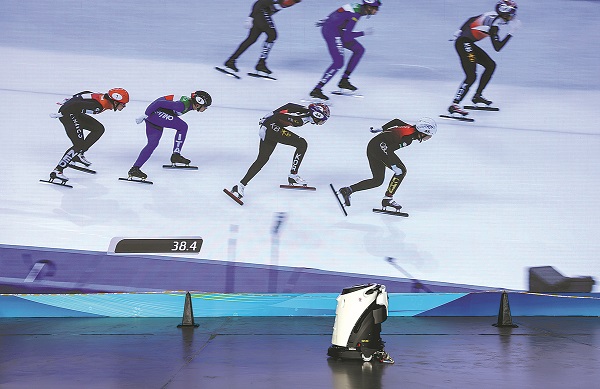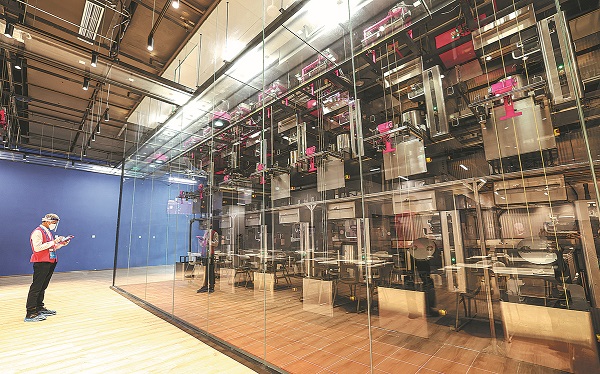AI tech touches ensure smoother, smarter Games

Artificial intelligence is being widely used at Beijing 2022, including the deployment of robots at competition and accommodation facilities. [Photo/Xinhua]
Artificial intelligence is playing a major role at the ongoing Beijing 2022 Olympic Winter Games, where it's being widely used in many areas including translation, coaching, scoring, security, epidemic prevention and catering.
An AI scoring system, which can convert the fleeting movements of the athletes into quantitative data indicators, is being used at the Games. The system not only helps athletes in pre-competition training, but also assists referees to accurately score and tally results.
AI and big data technologies are also being used to more accurately forecast weather conditions, down to every 100 meters updated every minute across the Olympic venues.
According to Chen Mingxuan, deputy head of the Institute of Urban Meteorology in Beijing and leader of the weather forecast support project for the 2022 Olympic Winter Games, meteorological support is important because 70 percent of the Olympic Winter Games are held outside on snow, and most are held in mountainous areas with complex terrain.
The result of using the AI system has made the safe management of outdoor slopes and courses less labor intensive and more efficient.
It frees human labor from having to patrol remote mountain areas with complex topography and harsh climates and environmental conditions, and the AI tech can easily work around the clock, according to China Science Intelli-Cloud Technology, an AI startup based in Hefei, Anhui province.

Artificial intelligence is being widely used at Beijing 2022, including the deployment of robots at competition and accommodation facilities. [Photo/Xinhua]
The company is the provider of the 24-hour unmanned inspection solution for the Olympic skiing venues.
"With the skiing venues covering 100 square kilometers across the mountains and with abundant forests, our smart solution can realize autonomous inspection leaving no blind spots, to ensure fire prevention, spot illegal activity, guarantee safety on the ski lanes, and discover emergencies and sound the alarm calling for first aid," said Wei Hongfeng, CEO and chief scientist at IntelliCloud.
On a skiing course in Zhangjiakou, Hebei province, where temperatures at night can fall as low as -40 C, 13 intelligent monitoring poles-3.5-meter-high poles fitted with surveillance cameras that can rotate automatically-form an invisible safety barrier, according to Wei.
These "robots", developed jointly by IntelliCloud and Fengyun Zhangjiakou Information and Technology System, can automatically and accurately identify trespass and upload the monitored situation to a command center, effectively improving the efficiency of security at Olympic venues.
IntelliCloud said the robots can operate in temperatures lower than -40 C.
- Top legislature schedules standing committee session for late February
- China's top legislator meets with Uruguayan president
- Senior legislator surveys Anhui on formulating outline of provincial 15th Five-Year Plan
- China's top legislator meets with British PM
- NPC deputies see more engagement with top court



